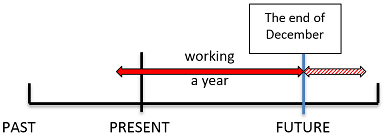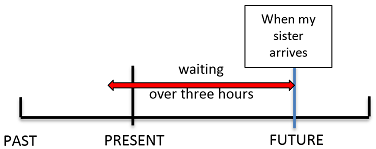Future perfect continuous
(Future perfect continuous)
Introduzione
Usiamo il future perfect continuous per descrivere un'azione progressiva che è già in corso in un momento del futuro.
Spesso lo usiamo con "for" per esprimere la quantità di tempo dal momento dell'inizio dell'azione ad un punto del suo progresso nel futuro o ad un momento in cui pensiamo che l'azione finirà.
Possiamo anche usarlo per descrivere un'azione progressiva che pensiamo o prevediamo sia in corso al momento.
Esempi
- "At the end of December, James will have been working at the company for a year."

- "By the time my sister arrives at the airport, I will have been waiting for over three hours."

- "Sarah won't have been reading her emails because she’s on holiday."

Forma
Formiamo il future perfect continuous con "will have been" + la forma in "-ing" del verbo principale.| Positivo |
I
You We They He / She / It |
will have been | waiting | for 3 hours. |
| Negativo |
won't have been
will not have been |
| domanda | Will |
I
you we they he / she / it |
have been | waiting | for 3 hours? |
Spesso usiamo il future perfect continuous con eventi o tempi futuri e con espressioni che si riferiscono al futuro come "quando" o "prima che (qualcosa succeda)" e "per quanto tempo".
Esempi
- "I will have been reading this book for months by the time I finally finish it."
- "She won’t have been expecting you to arrive so early."
- "When you finish your exams, for how long will you have been studying English?"
Pratica
.Ulteriore pratica
Completa le frasi per formare il future perfect continuous con la risposta corretta tra a, b, c o d:.
Create a free Getting Started account
Altri link utili
I seguenti esercizi prevedono l'uso della seguente struttura grammaticale:
Potresti essere interessato anche a:
- Business English vocabulary exercises
- Scenario-based dictation exercises – business English Account Pro
Potresti essere interessato anche a:
Principiante
- Passato semplice
- Passato remoto progressivo
- Indicativo presente
- Presente progressivo (presente)
- Passato prossimo
- 'Going to' e 'will'
- Presente progressivo (futuro)
- Imperativi
- 'To be'
- Pronomi: soggetto, oggetto
- Pronomi: relativi
- Aggettivi e pronomi: possessivi
- Aggettivi e pronomi: dimostrativi
- Ordine di base degli aggettivi
- Domande WH (pronomi interrogativi)
- Articoli: a, an, the
- Preposizioni: tempo e spazio
- 'There is' / 'there are' e quantificatori
- Congiunzioni 'and', 'or', 'but'
- Comparativi / superlativi (than)
- Zero conditional (se)
- First conditional (se)
- Modali: 'can' / 'can't', 'could', 'will', 'shall'
- Modelli verbali
- Sequence adverbs
Intermedio
- Trapassato remoto
- Passato remoto vs. passato prossimo
- Passato remoto vs. passato remoto progressivo
- Passato prossimo progressivo
- Futuro
- Futuro progressivo
- Passivo
- Discorso indiretto
- 'Used to' / 'would'
- Second conditional
- Third conditional
- Proposizioni relative
- Pronomi riflessivi
- Modali: 'must', 'have to', 'should', 'should have'
- Modelli verbali: gerundio o infinito
- Avverbi di grado
- Ordine degli aggettivi
- Aggettivi: '-ed' o '-ing'
Grammatica
Individua in modo rapido e concentrati su problemi grammaticali:
- Fogli degli esercizi di grammatica e test
- Scenario-based grammar exercises
- Grammar additional practice questions
- Verb conjugation practice
- Pratica sui condizionali
Migliora la grammatica
Vocabolario
Vocabulary exercises:Espandi il tuo vocabolario coi nostri tre trainer di vocabolario:Fai pratica di spelling usando i nostri tre test di spelling:Fai pratica con il vocabolario relativo a grafici e tabelle:
Impara il lessico
Lezioni video
Concentrati su aree di Business English specifiche con le nostre lezioni video:
Segui una lezione video





